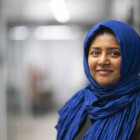Presentation Panel
Inclusive AI: Supporting Neurodiversity and Accessibility
Date Thursday, Dec 4 Time – Room: Bellevue
How can AI be harnessed to create truly inclusive learning environments? This session spotlights innovative approaches to accessibility and neurodiversity, focusing on human-centred design and the diverse ways learners engage with education. Presentations highlight how AI can support hard-to-reach learners, adapt to neurodivergent cognitive styles, and enhance access for those with disabilities. Explore practical strategies for reducing barriers, embedding accessibility from the ground up, and ensuring inclusive design principles are central to AI in education.

David Banes
Chairperson, Zero Project
David Banes is Director of David Banes Access and Inclusion Services and co-founder of Global symbols, having worked in assistive technology for the past 35 years leading assistive technology services in Europe and the Middle East, including Mada in Qatar from 2010-2016. He now works across the globe, including projects with low and medium-income countries in Eastern Europe, Africa and South Asia to support implementation of access and inclusion from policy to practice through capacity building.
He has a special interest in both emerging and low-cost technologies and their impact upon people with a disability, including the use of AI to augment communication, emerging technologies and mobility, technology and self-management of mental health, addressing hidden disabilities including communication needs and autism and the use of innovation to build resilient AT and AAC services during the pandemic.
David writes regularly on the tools and techniques. Recent publications include emerging technologies and the impact on universal design for learning, economic return on investment in AT, and the potential impact of frugal innovation on the provision of assistive products. He is a founder and director of DATEurope, the Digital Assistive Technology association for Europe.
He speaks widely as a keynote and workshop facilitator on assistive and accessible technology, including at the Zero Project, ICCHP-AAATE, ATIA, ATAAC, and a range of bespoke events online and in person. He is on the editorial board of Assistive Technology Outcomes and Benefits, Journal of Assistive Technologies and the Journal of Rehabilitation and the Journal of Disability and Rehabilitation, Assistive Technology. He is an adjunct Fellow o the University of Southampton.
Links

Mahreen Ferdous
Evaluation and Impact Manager, Ufi VocTech Trust
Mahreen leads our evaluation strategy, working across Ufi to ensure we gather the best possible evidence of our impact and draw out the insights that can be used to support the organisations we work with.
Prior to Ufi, her focus was on sales and of client management across finance, recruitment and digital marketing. She has an MA in Economic Development from SOAS and an MA in Economics from the University of Cambridge University.

Martin Uradnicek
AI Solutions Specialist, NAY a.s.
Martin Uradnicek is an AI Solution Specialist at NAY, a leading electronics retailer in Slovakia, where he leads internal AI initiatives. Alongside his professional role, he independently explores how AI can support neurodivergent minds, drawing from his personal experience with ADHD.
His focus is on making technology more inclusive, adaptive, and aligned with how different brains function - especially for those underserved by traditional systems. Martin regularly shares insights on responsible AI adoption and inclusive design. At OEB, he will present practical ways to use AI that respect cognitive diversity and challenge one-size-fits-all approaches to learning and productivity.

Bill Conran
Head of Global Sales, Open LMS
Bill Conran is the Head of Global Sales at Open LMS and has over 15 years of leadership experience in the eLearning industry. He’s passionate about utilizing learning analytics to improve the workforce. Bill specializes in making complex solutions easy to understand and demonstrating how software can create safe, productive, and profitable organizations. Bill has been with Open LMS’s parent company, Learning Technologies Group plc, since 2016 when he served as Head of Sales at Open LMS’s sibling company, Watershed. He holds a degree in Management and Human Relations from Trevecca Nazarene University and lives in Nashville, Tennessee.
Links
Moderator

Herman van der Merwe
Deputy Dean: Teaching & Learning, North-West University
Prof Herman calls himself a “recycled Geneticist”, but his previous Vice-Chancellor renamed him “e-Man” to capture his fascination for the use and management of technology in education!
Currently Deputy Dean of the Faculty Economic and Management Sciences, responsible for Teaching and Learning and the CEO of an expert centre called CUTE (Centre for the Utilisation of Technology in Education).
A CoP in innovative teaching and learning with technology (iTLT) support his research initiatives in a creative environment.
In 2015 the University recognised his contribution to innovation with an “Innovation Evangelist” award.
“As a teacher, researcher, policy advocate, manager and leader, he is a visionary leader whose fascination with technology has been informed by his commitment to serving the highest ideals of people and education.” Prof Reggie Ncobo
Links
Building and Implementing Inclusive AI for All – Addressing the Needs of Learners With a Disability, David Banes
This session will explore how artificial Intelligence offers new ways to support the needs of learners with disabilities. It will also highlight some of the risks and challenges for those with a disability in the wider application of AI within teaching and learning.
Human-Centred Innovations for Hard-to-Reach Learners, Mahreen Ferdous
This presentation will explore how human-centred design principles are revolutionising educational access for traditionally underserved learners. It will be framed around three practical case studies.
Neurodivergent by Design: How AI Helps Brains That Learn Differently, Martin Uradnicek
This presentation will focus on how AI can help neurodivergent minds thrive in educational settings by adapting to different cognitive styles and removing learning barriers rather than forcing conformity. Drawing from firsthand ADHD experience and practical AI development, the session shows how inclusive design principles can empower diverse learners.